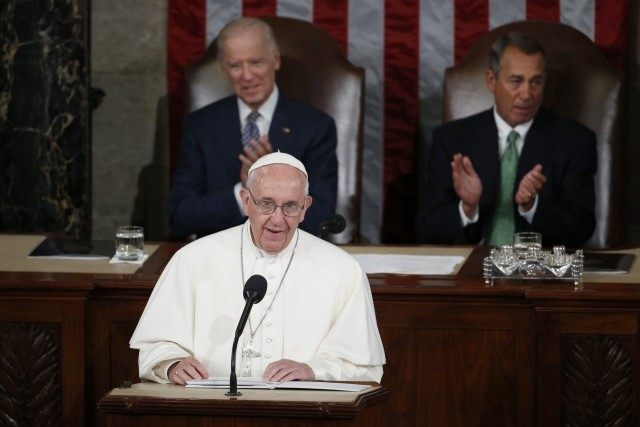
Editor’s note: Pope Francis just completed his first visit to the United States. In light of all the commentary it generated, Professor Charles Arand offers these first thoughts on Francis’ encyclical Laudato Si’. The full review will appear in the upcoming Fall 2015 issue of Concordia Journal.
Francis of Assisi’s famous “Canticle of Brother Sun,” or “Canticle of the Creatures,” opens with the line, “Praised be you, my Lord, through all your creatures.” This famous canticle praises God by extolling the wonders of his creation. Over the centuries, it has provided the inspiration for hymns such as, “All Creatures of Our God and King.” And now, the opening words, “Blessed be” supplies the title for the first encyclical issued by Pope Francis that can be considered entirely his.
The much anticipated new papal encyclical, Laudato Si’, made its appearance on June 18, 2015. But should conservative Lutherans pay any attention to it, and if so, why? I would suggest that we should for several reasons.
First, the pope is the one person in the world who is able to attract a hearing from both Christians and non-Christians alike. This is in part because he shepherds a flock of nearly 1.2 billion people worldwide. And it is in part because he is recognized as person who carries a great deal of moral authority. And in Francis’ particular case, he carries a great deal of personal respect for his humility and generosity.
Second, an encyclical is one of the more authoritative teaching documents that a pope can issue (only an Apostolic Constitution ranks higher). Popes usually issue an encyclical to provide a moral foundation on topics of great significance. So when Cardinal Jorge Mario Begoglio adopted the name Francis in honor of Francis of Assisi, it soon became rumored that he might issue an encyclical on the environment.
Third, we are a church that confesses and adheres to all three articles of the creed. We have irreconcilable differences with Rome on the second and third articles related to the work of Christ and justification by faith alone that date back to the sixteenth century. But we share a number of common convictions regarding the first article of the creed as it relates to the moral issues of society and God’s continuing work in creation (creatio continua).
Finally, the encyclical has received widespread publicity in the media and around the world. The themes and issues of this encyclical have especially resonated with many in the southern hemisphere. As one of my colleagues put it, many of the young people in Latin America have cheered Laudato Si’. Here was a pope who was addressing their concerns and issues. And on top of that, he was doing so in language that they understood and with a smile rather than out of anger.
In the United States, its reception has been more of a mixed bag as the document is frequently viewed through the lens of Democratic and Republican politics. It would be wrong, however, to evaluate the document through the lenses of American politics. Laudato Si’ cannot easily be cast into the camp of liberal or conservative politics. If one side finds support on the issue of climate change, it should also take to heart what the pope says about life issues. And if on the right, one grimaces at the pope’s critique of an unfettered free market, one can welcome his arguments for life issues.
In addition, it would be a mistake to think the document signals a significant shift in Roman Catholic teaching. It is true that it may be the first encyclical that focuses entirely on the stewardship of creation. But as Francis indicates at the outset, he is building on statements of his immediate predecessors. The document reflects a long tradition of catholic social teaching as it draws upon principles such as the dignity of work, the common good, subsidiarity, and the preferential option for the poor, etc. But what is new is the way Francis brings all of these together as interconnected issues while addressing matters related to the environment.
So what might we take away from the document? I would suggest several things. First, Francis provides a way of engaging those who do not share our beliefs in a post-Christian world. Second, the document provides some helpful lines of direction toward a more robust theology of creation and its use within the church. Finally, Francis encourages us to expand our horizons and embrace a comprehensive vision of the world. He challenges the church to take a global perspective in which a practical commitment to human beings and the environment take priority over a commitment to nationalities, ideologies, economic theories and politics.

Leave a Reply
You must be logged in to post a comment.